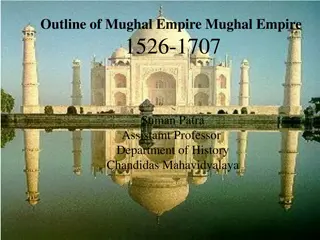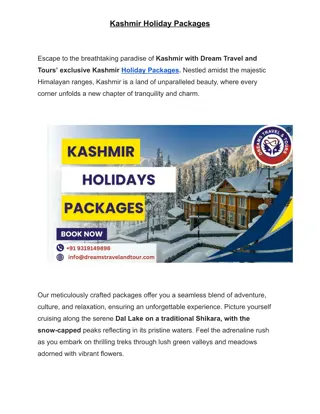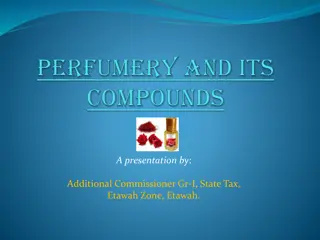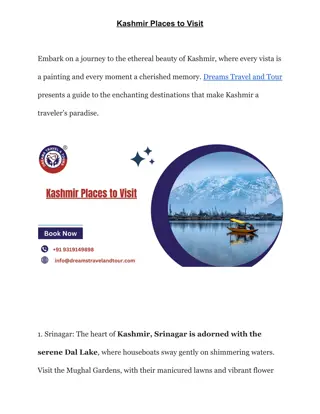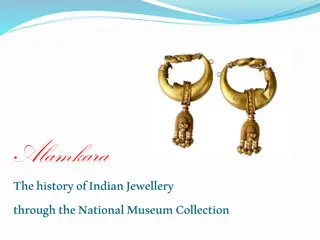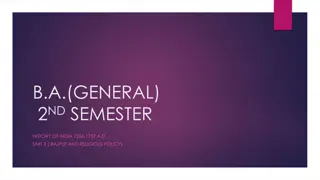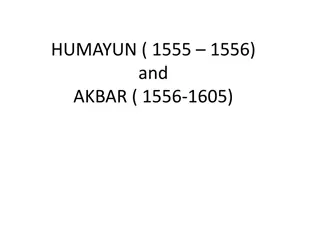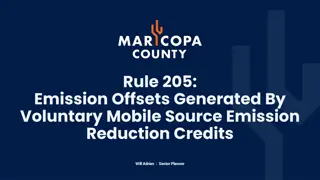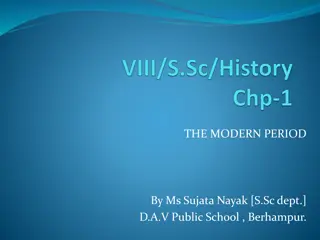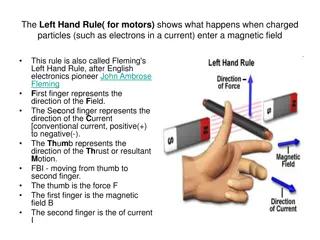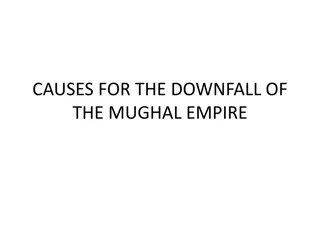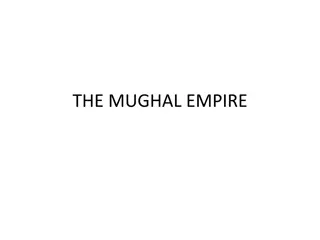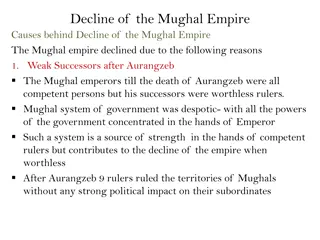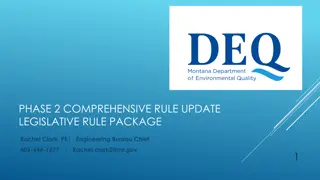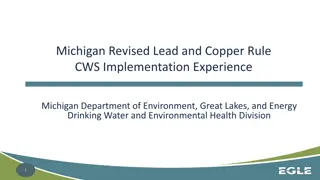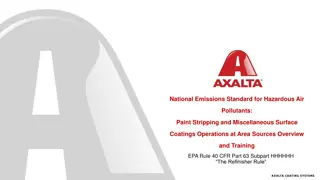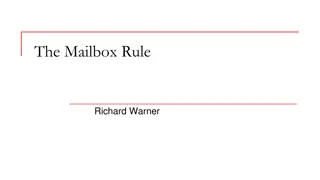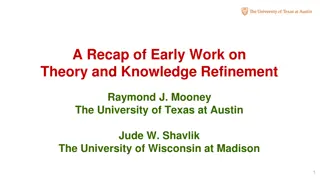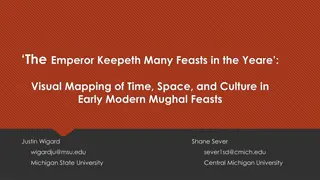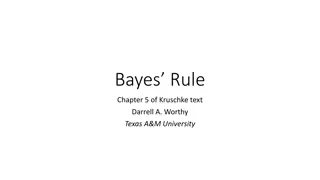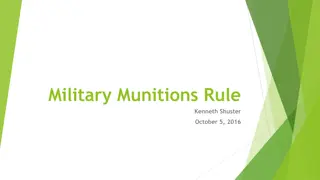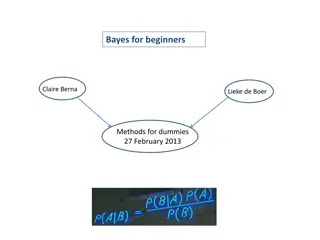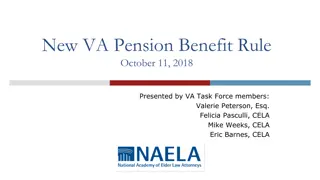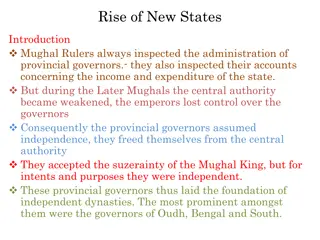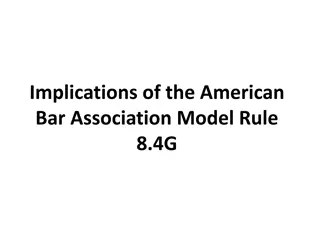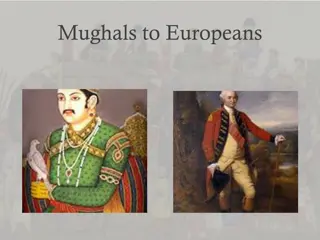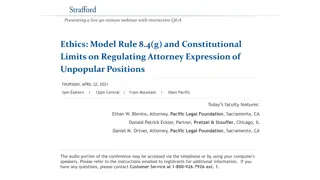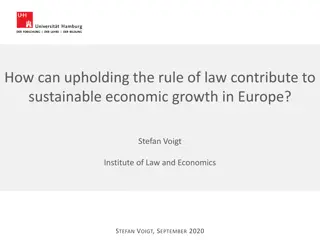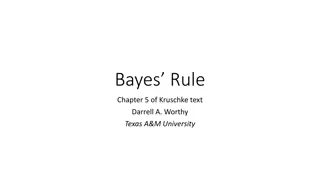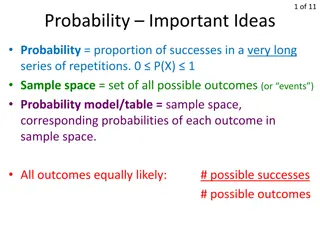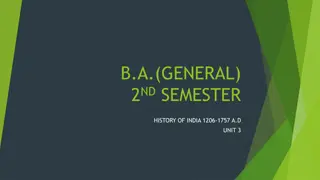AKBAR THE GREAT
After the death of Humayun, his young son Akbar assumed the Mughal throne with the guidance of Bairam Khan. Facing political unrest and enemies, Akbar's rule saw significant accomplishments, such as defeating Hemu at the Second Battle of Panipat and establishing a strong administrative system. His e
2 views • 31 slides
Emergency Response Proposed Rule - Worker Safety and Health Conference
The Emergency Response Proposed Rule aims to update regulations for worker safety and health, expanding coverage to include technical search and rescue and emergency medical service entities. The rule proposes replacing the existing Fire Brigades standard with an Emergency Response standard. Federal
2 views • 23 slides
Outline of Mughal Empire Mughal Empire 1526-1707.
The Mughal Empire in India from 1526 to 1707 was a significant period marked by notable rulers such as Babur, Humayun, Akbar, Jehangir, Shah Jehan, and Aurangzeb. These emperors each contributed differently to the empire's development, with highlights including military conquests, administrative ref
7 views • 14 slides
Kashmir Holiday Packages
Escape to the stunning beauty of Kashmir with Dream Travel and Tours' exclusive holiday packages. Cruise Dal Lake on a Shikara, trek through lush valleys, and explore Mughal gardens\u2014Immerse in Kashmir's culture and spirituality with top-notch accommodations and expert guides. Let us craft your
2 views • 2 slides
Insights into the Perfumery Industry in Kannauj
A presentation by the Additional Commissioner highlighting the historical backdrop and current state of the perfumery industry in Kannauj, including statistics on registered firms, tax liabilities, and the process of itra extraction. The industry plays a significant role in the region's economy, wit
0 views • 18 slides
Kashmir Places to Visit
Discover the allure of Kashmir with Dreams Travel and Tour. Explore Srinagar's Dal Lake and Mughal Gardens, ski the slopes of Gulmarg, wander through Pahalgam's pine forests, marvel at Sonmarg's glaciers, and venture into the rugged beauty of Leh-Ladakh. Let us guide you to the jewels of Kashmir.
2 views • 3 slides
Pascal's Rule in NMR Spectroscopy ( n+1 )
Pascal's Rule in NMR spectroscopy, also known as the (N+1) rule, is an empirical rule used to predict the multiplicity and splitting pattern of peaks in 1H and 13C NMR spectra. It states that if a nucleus is coupled to N number of equivalent nuclei, the multiplicity of the peak is N+1. The rule help
1 views • 30 slides
TSA Updates on Security Training Rule for OTRB Companies
In the recent updates by TSA, the Security Training Rule for over-the-road bus (OTRB) companies has been highlighted. The rule mandates TSA-approved security training for employees in security-sensitive roles, emphasizing key requirements and elements of security training. Urban areas covered by the
1 views • 18 slides
Exploring the Rich History of Indian Jewellery Through the National Museum Collection
Uncover the fascinating world of Indian jewellery through the historical artifacts in the National Museum Collection. From ancient adornments dating back almost 3000 years to the exquisite Mughal jewels, discover the evolution of styles, materials, and techniques. Explore the significance of jewelle
0 views • 16 slides
Evolution of Akbar's Religious Policy: A Historical Overview
In the 16th century, Akbar the Great implemented a revolutionary religious policy in the Mughal Empire. Initially a devout Sunni Muslim, Akbar evolved his stance to promote harmony and equality among all religions, fostering tolerance and understanding. This shift marked a significant departure from
1 views • 25 slides
Rajput and Religious Policy of Mughal Emperors: Akbar vs. Aurangzeb
Akbar, the first Mughal emperor, pursued a diplomatic policy towards the Rajputs, aiming to bring them under his suzerainty while maintaining friendly relations. His successor, Aurangzeb, adopted a more aggressive approach, seeking to annex Rajput kingdoms due to religious differences. This shift in
0 views • 6 slides
The Mughal Emperors Humayun and Akbar: A Legacy of Conquest and Diplomacy
Humayun, though not a skilled general, was kind and learned, while Akbar, one of the greatest monarchs of India, expanded the Mughal Empire through military conquests and strategic alliances with the Rajputs. Akbar's policy of religious tolerance and Rajput integration left a lasting impact on the M
0 views • 21 slides
Compliance Guide for Rule 205: Emission Offsets & Mobile Source Credits
Rule 205 outlines the process for generating emission offsets through voluntary mobile source emission reduction credits in Maricopa County. The rule-making process, state implementation plan submission, and permit conditions related to Rule 205 are discussed. The preparation for compliance includes
0 views • 7 slides
Modern Period of Indian History: From Mughal Decline to Independence
The modern period of Indian history began in the 18th century after Aurangzeb's death, marked by British colonization and the struggle for independence led by key figures like Gandhi. Sources like British documents, books, and speeches provide insights into this transformative era.
0 views • 11 slides
Understanding Fleming's Left Hand Rule and Electric Motors
Fleming's Left Hand Rule, also known as the Left Hand Rule for Motors, explains the interaction between charged particles and magnetic fields. Electric motors utilize this principle to convert electrical energy into mechanical energy through the interaction of magnetic fields and current-carrying co
2 views • 6 slides
Development of Indian Penal Code (IPC) 1860 and Its Impact in British India
The Indian Penal Code (IPC) of 1860 was introduced in British India after a series of historical events led to the need for a comprehensive criminal justice system. The disintegration of the Mughal Empire paved the way for British takeover, resulting in variations in criminal laws across different B
1 views • 24 slides
Causes for the Downfall of the Mughal Empire
The decline of the Mughal Empire post-Aurangzeb's reign was due to factors such as religious persecution, the Deccan policies, weak successors, financial difficulties, neglect of sea power, European settlement, and invasions. These political, social, and economic issues contributed to the downfall o
0 views • 9 slides
The Mughal Empire: History and Legacy
The Mughal Empire was founded by Babur, a skilled statesman and conqueror. His military conquests paved the way for the empire's expansion in India. Babur's son Humayun faced challenges during his reign, leading to a period of instability. Despite difficulties, the Mughal Empire left a lasting impac
0 views • 13 slides
Causes Behind the Decline of the Mughal Empire
The decline of the Mughal Empire was influenced by weak successors after Aurangzeb, degeneration of Mughal nobility, inefficiency of the army, economic bankruptcy, foreign invasions, wars of succession, and court factions. The empire faced challenges such as incompetent rulers, weakened military, fi
2 views • 5 slides
Understanding the Rule of Law and Legal Systems in Wales and England
The content discusses the nature of law, the Welsh and English legal systems, and the Rule of Law doctrine. It includes observations from the 2019 AS Law Unit 1 examination, emphasizing the importance of adhering to rubrics and answering questions clearly. Candidates faced challenges with timing and
0 views • 14 slides
Phase 2 Comprehensive Rule Update Legislative Rule Package Overview
Seven subdivision bills were adopted during the 2023 session, covering various topics such as independent reviewers, cut and fill systems, connection to public sewer systems, and more. The public comment period and hearing are scheduled, with the draft rule to respond to comments by August 25. A bil
3 views • 17 slides
Michigan Revised Lead and Copper Rule Implementation Experience
The Michigan Department of Environment, Great Lakes, and Energy shares insights on the implementation of the Michigan Revised Lead and Copper Rule. Key topics include rule revisions, data outcomes, challenges, and development drivers. The rule aims to reduce lead levels, update sampling protocols, a
0 views • 26 slides
EPA Rule 40 CFR Part 63 Subpart HHHHHH Overview
EPA Rule 40 CFR Part 63 Subpart HHHHHH, also known as The Refinisher Rule, sets standards for hazardous air pollutants in paint stripping and surface coatings operations. The rule aims to control emissions of target hazardous air pollutants in collision centers and surrounding areas. It outlines req
0 views • 20 slides
Understanding the Mailbox Rule in Contract Law
The Mailbox Rule, a common law principle, stipulates that acceptance of an offer is valid when dispatched, providing certainty in contract formation. This rule is illustrated through scenarios involving delays in mail delivery and parties' need for assurance in contractual agreements. The examples h
0 views • 14 slides
Evolution of Theory and Knowledge Refinement in Machine Learning
Early work in the 1990s focused on combining machine learning and knowledge engineering to refine theories and enhance learning from limited data. Techniques included using human-engineered knowledge in rule bases, symbolic theory refinement, and probabilistic methods. Various rule refinement method
0 views • 12 slides
Mapping Time and Culture: Mughal Feasts in Early Modern Era
Visual mapping of Mughal feasts in the early modern era provides insight into the historical and cultural connections between Eastern and Western memoirs. By analyzing the role of feasts in a connected history, this project applies a quantitative and visual approach through digital humanities to und
0 views • 11 slides
Understanding Bayes Rule and Its Historical Significance
Bayes Rule, a fundamental theorem in statistics, helps in updating probabilities based on new information. This rule involves reallocating credibility between possible states given prior knowledge and new data. The theorem was posthumously published by Thomas Bayes and has had a profound impact on s
0 views • 34 slides
History and Implementation of Military Munitions Rule
The history and implementation of the Military Munitions Rule, including its origins in regulations like RCRA and FFCA, the involvement of key stakeholders, identification of issues in rulemaking, and ensuring safe transportation and storage of hazardous waste. The process involved extensive consult
0 views • 26 slides
Introduction to Bayes' Rule: Understanding Probabilistic Inference
An overview of Bayes' rule, a fundamental concept in probabilistic inference, is presented in this text. It explains how to calculate conditional probabilities, likelihoods, priors, and posterior probabilities using Bayes' rule through examples like determining the likelihood of rain based on a wet
0 views • 21 slides
Understanding the New VA Pension Benefit Rule of October 11, 2018
VA Task Force members presented key changes in the VA pension benefit rule, focusing on net worth limits, transfer rules, exclusions, look-back periods, and penalties. The rule aims to uphold program integrity and align with GAO recommendations, impacting eligibility criteria for applicants. Key sec
11 views • 55 slides
U.S. EPA's Proposed Cross-State Air Pollution Rule Update for 2008 Ozone NAAQS
The U.S. Environmental Protection Agency (EPA) issued the Cross-State Air Pollution Rule (CSAPR) in 2011, aiming to improve air quality by reducing power plant emissions across state lines. Challenges and subsequent revisions led to the proposed CSAPR Update Rule in 2015, targeting interstate air po
0 views • 27 slides
The Rise of New States and Hindu Principalities in Decline of the Mughal Empire
During the later Mughal period, provincial governors gained independence, laying the foundation for new dynasties in regions like Oudh, Bengal, and South. The rise of Hindu states, including Rajputs and Sikhs, contributed to the disintegration of the Mughal Empire. Governors like Saadat Khan Burhan-
0 views • 8 slides
Implications of ABA Model Rule 8.4(g) on Professional Conduct
The American Bar Association's Model Rule 8.4(g) addresses professional misconduct in legal practice related to discrimination and harassment based on various factors. The rule has been adopted by some states, sparking discussions on its implications and challenges within the legal community. Explor
0 views • 67 slides
European Influence in South Asia: From Mughals to British Crown
Explore the historical journey of European intervention in South Asia, beginning with the Mughal era and culminating in British colonial rule. Learn about the motivations, impact, and changing relations over the centuries, from Portuguese exploration to the rise of the British East India Company.
0 views • 13 slides
Overview of the Mughal Empire and Its Great Mughals
The Mughal Empire was a significant imperial power in the Indian subcontinent from 1526 to 1757, ruled by Muslim descendants of Genghis Khan. The empire extended over a vast region and produced six great Mughal rulers: Babur, Humayun, Akbar, Jahangir, Shah Jahan, and Aurangzeb. Babur was the founder
0 views • 14 slides
Ethics & Constitutional Limits on Attorney Expression Webinar
Join the live 90-minute webinar on Ethics: Model Rule 8.4(g) and Constitutional Limits on Regulating Attorney Expression of Unpopular Positions featuring expert faculty members. Explore regulations governing lawyer speech and the requirements for lawyer communication in various contexts. Learn about
0 views • 57 slides
Upholding the Rule of Law for Sustainable Economic Growth in Europe
Democracy and the rule of law are essential for sustained economic growth in Europe. The rule of law ensures stable and impartial enforcement of rules such as property rights and contract law, key for market economies. Upholding the rule of law is crucial for combating corruption and maintaining a f
0 views • 6 slides
Bayes’ Rule
Bayes Rule, a fundamental concept in statistics, explores how prior beliefs are updated based on new evidence. This rule, named after Thomas Bayes, has had a profound impact on statistical inference and has been further developed by mathematicians like Laplace. Exploring the probabilistic reasoning
0 views • 34 slides
Understanding Probability: Key Concepts and Rules
Probability is the proportion of successes in a long series of repetitions. Important ideas include the 0-1 Rule, the 100% Rule, the Complement Rule, the Addition Rule, and the Multiplication Rule. These rules govern the calculation of probabilities in various scenarios. Learn the fundamental princi
0 views • 16 slides
Akbar's Consolidation of Mughal Rule and Administrative Reforms in India (1206-1757)
Akbar, following Humayun's death, defeated Hemu and established Mughal rule. His reign marked significant administrative and revenue reforms, including Hindu participation and religious tolerance. Akbar's policies led to the expansion and consolidation of the Mughal Empire across northern and centra
0 views • 5 slides


